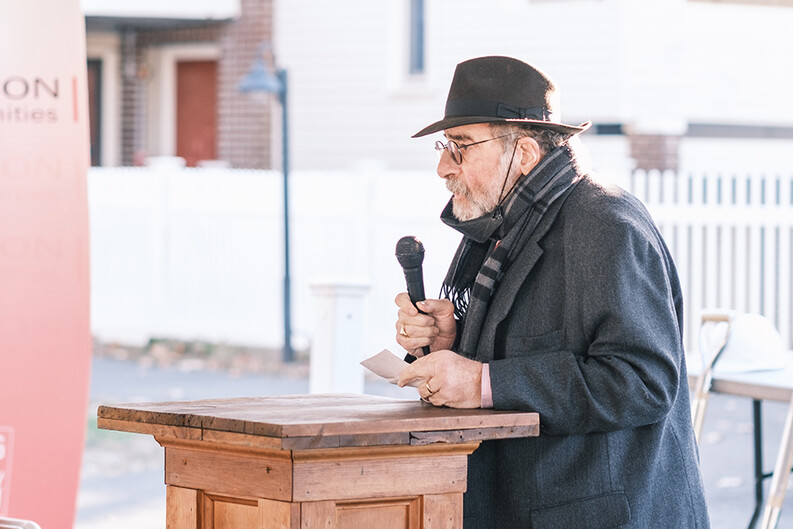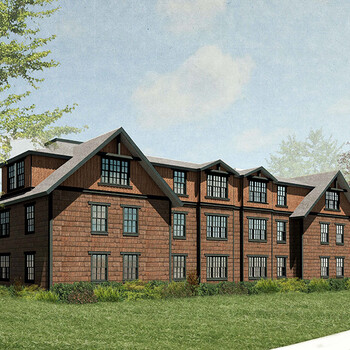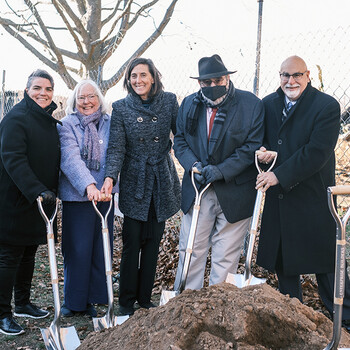“A Case Study in Perseverance”: Homes Break Ground After Years of Help from Clinics

New homes years in the making are under construction in Branford, Connecticut, where two Yale Law School clinics have long represented local partners pushing for affordable housing.
The redevelopment of Parkside Village, which broke ground on Nov. 21, follows years of work and planning by the Branford Housing Authority and project developer Beacon Communities LLC. This milestone also comes after years of effort by Yale Law School students. The Ludwig Center for Community & Economic Development Clinic4 (CED) and the Housing Clinic5 represent the housing authority, as well as Branford Affordable Housing, Inc., a local nonprofit created to participate in this project and advocate for affordable housing in town more broadly. The clinics have been working on the project since 2017.

“It was an honor to work with Branford community members, clinical faculty and fellow students who were so committed to expanding mobility and equity in housing within the area,” said Gabriel Gassmann ’24, a member of the Community and Economic Development Clinic. “Having the chance to see this project almost to its closing after all the hard work that had been put in counts as one of the highlights of my law school experience.”
The new 67-unit apartment building replaces and expands one built in the 1970s and includes new shared amenities and accessibility features. A significant change: the building now welcomes families of all ages. While the old Parkside allowed only seniors and people living with a disability, the new building designates 60 units for lower income families. Parkside now also includes apartments sized for families. While the previous building had studios and small one-bedroom units, the new one also contains two-bedroom apartments. All previous residents are guaranteed a home in the new building.
“Having the chance to see this project almost to its closing after all the hard work that had been put in counts as one of the highlights of my law school experience.”
— Gabriel Gassmann ’24
Over the years, CED helped the housing authority win zoning approval for the redevelopment, secured recognition of tax-exempt status for Branford Affordable Housing, Inc. as a nonprofit, and negotiated various contracts and financing documents relating to the development. In 2021, the clinic helped the development team win federal Low Income Housing Tax Credits6 that ensured necessary funding.
“The students who began this process while working with CED have graduated, but our team got to see how years of collaboration and advocacy will pay off to the benefit of the Branford community,” Johnathan Terry ’23 said.

From the start, the project saw resistance from neighbors and town officials opposed to increasing the number of units and lifting age restrictions at the complex. The conflict culminated in two successful lawsuits challenging the town’s denial of the project.
“The clinics’ work in Branford is part of a broader ongoing effort to improve access to affordable housing options throughout the region and state,” said Nathan Cummings ’23, who is also a member of the clinical student team helping to challenge exclusionary zoning practices in the nearby town of Woodbridge7.
Caroline Parker ’23 appreciated the opportunity to observe the relationship between transactional work, litigation, and advocacy in action.
“This was a long fight that required lawyering in many different dimensions,” she said. “Parkside is a case study in perseverance.”
“We, truly, never could have done this without the clinic. I, personally, learned a great deal about the law, particularly in how it can be used to support those who might otherwise be powerless.”
— Doug Denes, former Branford Housing Authority Chair
Doug Denes, a Branford resident who served as Chair of the housing authority for many years, praised the clinic’s work.
“We, truly, never could have done this without the clinic,” Denes said. “All of the clinic participants (faculty, fellows and students) were impressively smart and committed and I, personally, learned a great deal about the law, particularly in how it can be used to support those who might otherwise be powerless.”
Current students who have worked with the housing authority are Daniel Backman ’23, Rubin Danberg Biggs ’23, Nathan Cummings ’23, Gabriel Gassmann ’24, Caroline Parker ’23, and Johnathan Terry ’23. Clinical Professor of Law Anika Singh Lemar and Clinical Lecturer and Eugene Ludwig/Robert M. Cover Fellow in Law Adam Cowing supervise the Community and Economic Development Clinic, which provides a range of legal services to clients whose work generates economic mobility and community growth. The Housing Clinic is supervised by Nathan Baker Clinical Professor of Law J. L. Pottenger Jr. ’75. It fights foreclosures, defends evictions, and brings fair housing civil rights cases combatting economic and racial segregation in Connecticut. Both clinics are part of the Jerome N. Frank Legal Services Organization at Yale Law School.


